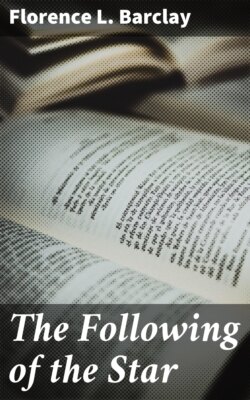Читать книгу The Following of the Star - Florence L. Barclay - Страница 17
На сайте Литреса книга снята с продажи.
THE TOUCH OF POWER
ОглавлениеTable of Contents
As they passed into the drawing-room, David's eye fell on a grand piano, in black ebony case, to the left of the doorway.
"Oh!" said David, and stopped short.
"Does that tempt you?" asked Diana. "Yes; I might have known you were full of music. Your sufferings, over the performances of the Brambledene choir, were more patent than you realised."
David's fingers were working eagerly.
"I so rarely get the chance of a piano," he said. "Like chaperons, we don't have them in Central Africa. I went without all manner of things to be able to afford one in my rooms at college; but, since then—Is it a Bechstein, or what?"
"I really do not know," laughed Diana. "It is an article of furniture I do not use. Once a quarter, it lifts up its voice, poor dear, when a sleek person with a key of his own, arrives unexpectedly, asking for a duster, and announcing that he has come to tune it. He usually turns up when I have a luncheon party. Occasionally when Chappie is feeling low, and dwelling on the departed Marmaduke, she feels moved to play 'Home, Sweet Home'; but when Chappie plays 'Home, Sweet Home' you instantly discover that 'there's no place like'—being out; and, be it ever so cheerless, you catch up a hat, and flee! You may carry off the piano to Africa, if you will, Cousin David. And, meanwhile, see how you like it now, while I try to collect my ideas, and consider how best to lay my difficulties before you."
She moved across the long room, to the fireplace, drew forward a low chair, turning it so as to face the distant piano.
David, tingling with anticipation, opened the instrument with reverent care.
"It is a Bechstein," he said; then took his seat; pausing a moment, his hands upon his knees, his dark head bent over the keys.
Diana, watching him, laughed in her heart.
"What an infant it is, in some ways," she thought. "I do believe he is saying: 'For what we are about to receive'!" But, in another minute her laughter ceased. She was receiving more than she had expected. David had laid his hands upon the keys; and, straightway, the room was filled with music.
It did not seem to come from the piano. It did not appear to have any special connection with David. It came chiefly from an unseen purple sky overhead; not the murky darkness of an English winter, but the clear over-arching heavens of the Eastern desert—expansive, vast, fathomless.
Beneath it, rode a cavalcade of travellers—anxious, perplexed, uncertain. She could hear the soft thud of the camels' feet upon the sand, and see the slow swaying, back and forth, of the mysterious riders.
Suddenly outshone a star,—clear, luminous, divine; so brilliant, so unexpected, that the listener by the fireplace said, "Oh!"—then laid her hand over her trembling lips.
But David had forgotten her. His eyes were shining; his thin face, aglow.
Now all was peace and certainty. They travelled on. They reached Jerusalem. The minor key of doubt and disappointment crept in again. Then, once more, shone the star. They arrived at Bethlehem. In chords of royal harmony they found the King. O worship the Lord in the beauty of holiness!
Diana's face sank into her clasped hands. The firelight played upon her golden hair.
She knew, now, just how far she had wandered from the one true Light; just how poor had been her response to the eternal love which brought the Lord of glory to the manger of Bethlehem; to the village home at Nazareth; to the cross of Calvary. The love of Christ had not constrained her. She had lived for self. Her heart had grown hard and unresponsive.
And now, in tenderest, reverent melody, the precious gifts were being offered—gold, frankincense, and myrrh. But, what had she to offer? Her gold could hardly be accepted while she withheld herself. Yet how could love awaken in a heart so dead, so filled with worldly scorn and unbelief?
The music had changed. It no longer came from unseen skies, or ranged back into past scenes, and ancient history. It centred in David, and the piano.
He was playing a theme so simple and so restful, that it stole into Diana's heart, bringing untold hope and comfort. At length, she lifted her head.
"What are you playing, now, Cousin David?" She asked, gently.
David hushed the air into a whisper, as he answered: "A very simple setting, of my own, to those wonderful words, 'At even, e'er the sun was set.' You know them? The old tune never contented me. It was so apt to drag, and did not lend itself to the crescendo of hope and thankfulness required by the glad certainty that the need of each waiting heart would be fully met, nor to the diminuendo of perfect peace, enfolding each one as they went away. So I composed this simple melody, and I sing it, by myself, out in the African forests most nights, when my day's work is over. But it is a treat to be able to play it here, with full harmonies."
"Sing it to me," said Diana, gently.
And at once David began to sing, to his own setting, the tender words of the old evening hymn. And this was what he sang:
Holy Star
"At even ere the sun was set"
